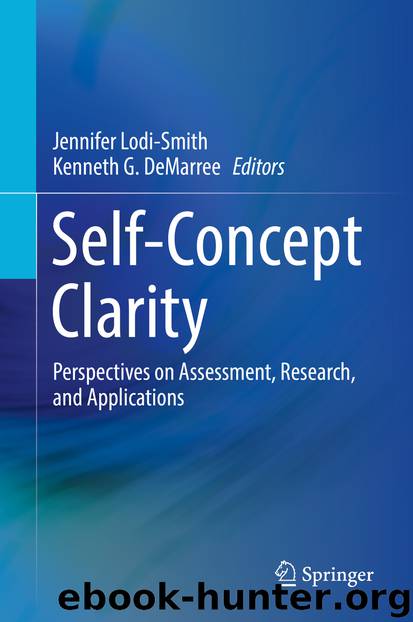Self-Concept Clarity by Jennifer Lodi-Smith & Kenneth G. DeMarree

Author:Jennifer Lodi-Smith & Kenneth G. DeMarree
Language: eng
Format: epub
Publisher: Springer International Publishing, Cham
Keywords
SelfIdentitySelf-concept clarityGroup identityCollective identityWell-being
Although we assume a constant striving for unity, we do not assume that the outcome of the striving is necessarily successful…If we accept definitions of ourselves as members of groups, it is just as necessary to maintain these definitions as to maintain definitions of ourselves as isolated individuals.
Prescott Lecky (1945).
Few ideas have been as quietly influential as Prescott Lecky’s insight that self-consistency was a fundamental human motive (Lecky, 1945). His collected writings, Self-Consistency: A Theory of Personality, were groundbreaking in their reexamination of psychological topics as varied as habitual behavior, learning, emotional processes, and clinical disorders through the distinct lens of a person’s quest for subjectively coherent selfhood. Lecky (1945) rebelled against the dominant schools of psychological thought during his career, rebuking both Freudian and Pavlovian accounts of human motives. In their place, he offered an elegantly simple idea: humans need to understand themselves as stable and predictable, and will continuously strive for consistency among their existing self-views and behavior. Thus, a full decade or more before Festinger’s (1957) cognitive dissonance theory , Roger’s (1959) notions of self-congruence, Heider’s (1960) balance theory, Swann’s (1983) self-verification theory, or Higgins’ (1987) self-discrepancy theory, Lecky (1945) had identified self-consistency as the primary driver of both behavior and self-evaluation and had posited that an individual’s most fundamental goal was to craft and maintain a self that they subjectively understood to be coherent, temporally stable, and internally consistent. In other words, Lecky’s all important “striving for unity” represented the pursuit of what Jennifer Campbell and her colleagues (1990, 1996; current volume) would later refine into the construct of self-concept clarity.
Equally important, Lecky (1945) understood that the self encompassed more than individual characteristics . In this, he echoed James (1890) in discussing how close relationships and group memberships were incorporated into and as important to the self as were individual characteristics and values. Social self-representations were largely neglected in the modern study of the self-concept until the seminal work of Markus and Kitayama (1991) describing interdependent self-construals as a self-system. Though the initial focus was largely on interdependent selves as a cultural variable, because humans are universally socialized in relationships and groups, all humans maintain an interdependent or social self-system that is as powerful but distinct from the independent or individual self system—the two systems are motivated by distinct values (e.g., Gardner, Gabriel, & Lee, 1999), gain esteem through different mechanisms (social reflection rather than comparison; Gardner, Gabriel, & Hochschild, 2002), and operate through different regulatory foci (Lee, Aaker, & Gardner, 2000). However, research that explores self-concept clarity beyond the level of the individual self remains rare. How do our relationships and group memberships contribute to a clear, consistent, and coherent understanding of ourselves?
The interdependent self can be further subdivided into distinct relational and collective levels of self-representation (e.g., Brewer & Gardner, 1996; Cross, Hardin, & Swing, 2009), and the interplay of self-concept clarity within each of these levels is in its infancy. For example, research has begun to investigate how couples may
Download
This site does not store any files on its server. We only index and link to content provided by other sites. Please contact the content providers to delete copyright contents if any and email us, we'll remove relevant links or contents immediately.
Should I Stay or Should I Go? by Ramani Durvasula(6846)
Why We Sleep: Unlocking the Power of Sleep and Dreams by Matthew Walker(5699)
Fear by Osho(4114)
Flow by Mihaly Csikszentmihalyi(4092)
Why We Sleep by Matthew Walker(3809)
Rising Strong by Brene Brown(3807)
Too Much and Not the Mood by Durga Chew-Bose(3718)
How to Change Your Mind by Michael Pollan(3709)
The Hacking of the American Mind by Robert H. Lustig(3611)
Lost Connections by Johann Hari(3478)
He's Just Not That Into You by Greg Behrendt & Liz Tuccillo(3336)
Evolve Your Brain by Joe Dispenza(3082)
What If This Were Enough? by Heather Havrilesky(2961)
Resisting Happiness by Matthew Kelly(2908)
Crazy Is My Superpower by A.J. Mendez Brooks(2886)
The Courage to Be Disliked by Ichiro Kishimi & Fumitake Koga(2834)
The Book of Human Emotions by Tiffany Watt Smith(2795)
Descartes' Error by Antonio Damasio(2769)
In Cold Blood by Truman Capote(2711)
